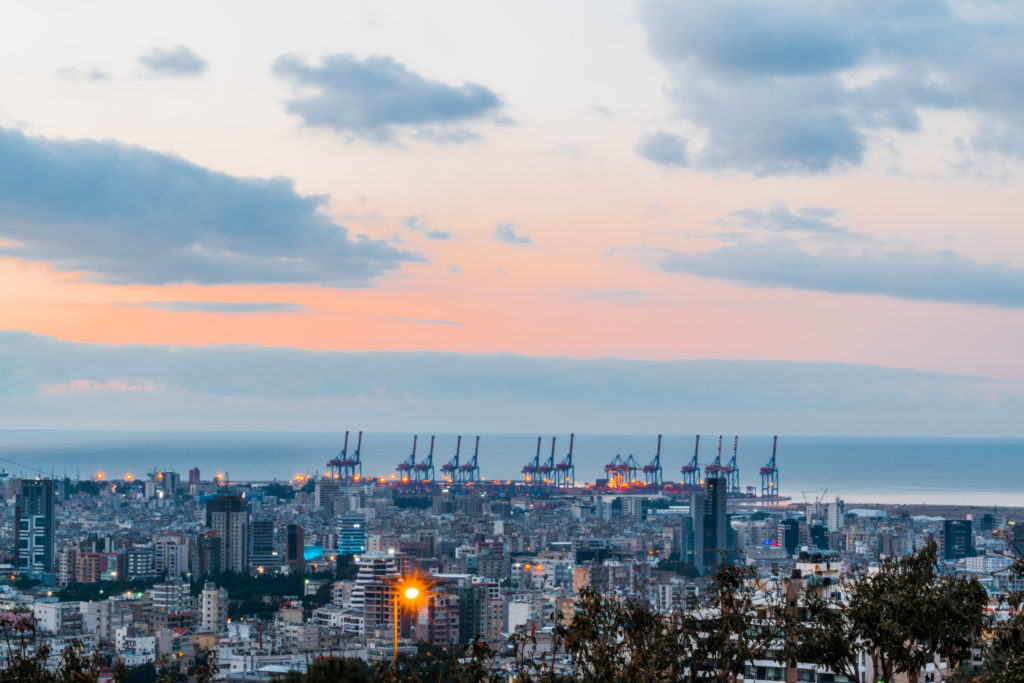This is not Beirut.
But no—this is Beirut! A city broken and wounded, whose blood spreads like glass over the eyes. A city paved with glass, as though glass had turned into eyes, plucked out and filling the streets. In Beirut, you must tread on your eyes in order to see. And when you see, you are struck blind. A city of glassy blindness, of ammonium nitrate, and of the searing blast that swallowed the city and split the sea.
This is not Beirut.
For forty-five years we have been saying of Beirut that it is not Beirut. We lost Beirut while searching for it in the deficient past. “The City of Is-No-More”—that is the name we gave it, for, starting with the destruction of the civil war, we have attributed everything in Beirut to its past. This week, however, as we fell to the ground before the monster that exploded at the city’s port, we discovered that it was the destruction itself that was our city, these houses stripped naked were our houses, these groans were our groans.
This is Beirut! Everyone, tear your eyes away from the ground and behold your city reflected in these ruins! Stop searching for its deficient past! Do not stand and wonder, for the explosion that turned your city to rubble was neither coincidence nor mere accident. It was your truth that you have tried so long to hide. A city handed over to thieves to violate, a city where the authority of idiots holds sway and which has been ripped apart by warlords working for foreign powers.
A city that exploded because it lay prone on the bed of its drawn-out death agonies.
Don’t ask the city who killed it. Those who killed it were those who rule it. Beirut knows this, and all of you know it.
The killers of the city are the ones who tried to kill the 17 October Revolution by forming a government of technocratic puppets and who unleashed the dogs of repression on the streets.
The killers of the city are the communal party Mafias that took the country over and proclaimed the civil war ended by converting its menacing ghost into a political regime.
The killers of the city are the ones who elected Michel Aoun as president, converting the catastrophe created by oligarchy into farce.
Your city—our city—is dying. Twenty-seven hundred tons of ammonium nitrate, confiscated and placed in the port six years ago, exploded, and the flesh of its children was scattered. What monstrous nonchalance and stupidity!
In the past, the warlords of the civil war buried chemical wastes in our mountains. Today we discover that the nonchalance of these same warlords, who have transformed themselves into the Mafia bosses of this era that they declared to be that of “national peace,” has allowed Beirut to be smashed to pieces by something approaching an atomic bomb.
They sit on thrones fashioned from the bones of our dead, our poverty, and our hunger.
Hyenas! Are you not yet done with tearing our corpses apart?
Be gone! The time has come for you to be gone! Leave us be with our country that you have dragged into the abyss! Go to the Caribbean with its islands and its ocean, to which you have smuggled the people’s wealth and property so that you can live in luxury there!
Are you not yet done?
Your death knell has struck. Our death, and the torment in our hearts, have today become the weapon with which we shall face the coming days of darkness and humiliation.
We shall face you with our charred corpses and with our bleeding faces, and you will drown with us in the abyss of this destruction.
Listen well! Beirut has blown us apart to proclaim your demise, not ours.
Beirut is not its past. Beirut is its present. It bleeds blood, not honor. Stop talking! Shut up! Nothing you have to say concerns us. We want just one thing from you, to be gone.
Go—you, and the bankers, and everyone else who has gambled with our lives all the way to Hell!
Then we shall bind Beirut’s wounds. We shall tell our city that it will return to us, poor but joyful. Its soul shall be renewed, and, though weakened by its wounds, it will hold us tight to its pain and wipe away the tears from our eyes.
The time of the bastards who have ruled our lives for so long is over!
We don’t want your masters’ oil, we don’t believe your mullahs, and we don’t give a damn about your sects!
Take your sects with you and get out of our way!
The young women and men of the 17 October uprising must know that the time for total revolution has come.
Arise, and let us take vengeance for Beirut!
Arise, and build a homeland for yourselves from the ruins!
Arise, and redraw Beirut in the ink of its children’s blood!
—Translated by Humphrey Davies
Humphrey Davies received the 2010 Prize for Arabic Literary Translation for his translation of Elias Khoury’s Yalo. In addition to translating Khoury novels, Davies has also translated Naguib Mahfouz’s Thebes at War, Alaa al-Aswany’s The Yacoubian Building, and Ahmad Faris al-Shidyaq’s Leg over Leg.
Elias Khoury was born in Beirut. His Gate of the Sun received the Palestian Prize and was named Best Book of the Year by Le Monde Diplomatique, the San Francisco Chronicle, and a Notable Book by the New York Times. Laila Lalami wrote in the Los Angeles Book Review: “the beautiful, resilient city of Beirut belongs to Khoury.” He encourages donations to the Lebanese Red Cross.
from The Paris Review https://ift.tt/3fxDPMo

Comments
Post a Comment